4.3 Railroads
4.3.1 Japan
Iida line
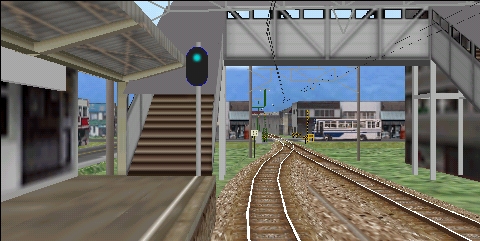
Description:
A part of the
Iida line (
JR Central)from
Nanakubo to
Okaya. An electrified line in a very beautiful landscape with mountains, rivers and canals. Many nice details in the landscape. There are 2 alternatives for this route: Express using the class 115-2000
EMU and local using the class 119
EMU.
Alt.:
Express
Stations:
25
Stops:
11
Alt.:
Local
Stations:
25
Stops:
24
Known problems:
None.
Line description:
Overview map (Acrobat document) with the
Iida line marked on the map. The simulated part of the line starts at the map south of
Komagane and goes northwards to
Okaya.
Download from:
The creator's website has disappeared from the Internet many years ago.
To download from this website:
OpenBVE route package ver. 1.0.0.2The code of this route has been adapted to load without errors and warnings in Open
BVE. The graphical experience is however not changed from Gaku's original work.
Last update of this directory entry:
2023-Jun-25
Kobe & Kyoto line
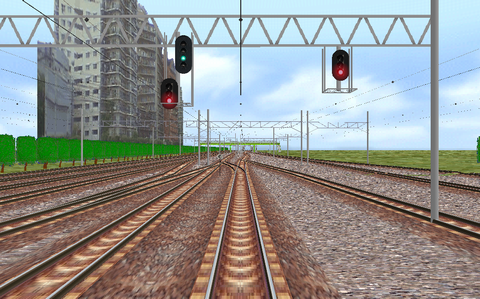
Description:
JR West Kobe line from
Kobe to
Osaka and the
JR West Kyoto line to
Kyoto for the class 223-2000
EMU. Details are sparse in the urban environment.
Alt.:
Spec. Rapid
Svc.
Stations:
29
Stops:
7
Known problems:
A track section at the Osaka station is displayed too high compared to the other rails.
Download from:
The website for this route has disappeared from the Internet long, long ago.
Last update of this directory entry:
2018-Jun-18
Kosei line
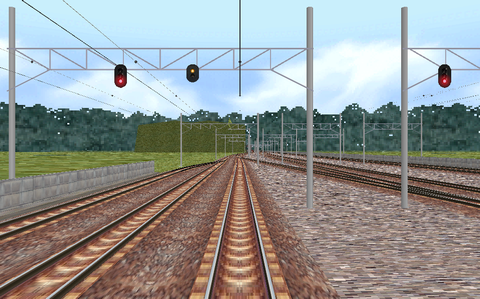
Description:
The
JR West Kosei line from
Kyoto (JR-B31) to
Omi-Maiko (JR-B19). The gauge is 1067
mm and the line is electrified with 1500
V DC overhead wires. No landscape details outside the railway.
Alt.:
1828M2 (Local)
Stations:
13
Stops:
12
Known problems:
Line description:
About the
Kosei line at
Wikipedia.
Download from:
The website for this route has disappeared from the Internet long, long ago.
Last update of this directory entry:
2018-Jun-18
Keio line
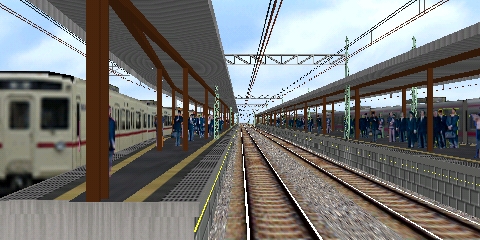
Description:
The
Keio line, the
Takao line and the
Sagamihara line (all
Keio Electric Railway
Co.,
Ltd.) for the class 8000 trains express alternative and the class 9000 trains
Rapid
alternative. The route comes in 3 versions: Semi-Special Express from
Shinjuku to
Takaosanguchi; Special Express from
Shinjuku to
Keio-hachioji;
Rapid
from
Shinjuku to
Hashimoto. The gauge is 1372
mm and the lines are electrified (1500
V DC). Many graphic objects at the railroad.
Alt.:
Rapid
Stations:
27
Stops:
20
Alt.:
Semi-Special
Exp.
Stations:
37
Stops:
11
Alt.:
Special Express
Stations:
32
Stops:
6
Known problems:
None.
Line description:
Schematic map over the Keio lines (Acrobat document) there all route alternatives start at
Shinjuku near the top of the map at the
Keio line. The Semi-Special Express alternative (orange line at the map) goes to
Kitano, from there the
Takao line and ends at the station
Takaosanguchi at the bottom of the map. The Special Express alternative (red line at the map) goes all the
Keio line and ends at
Keio-hachioji, the other station far down at the map. The Rapid alternative (blue line) goes to
Chofu and then the
Sagamihara line to the right and downwards at the map to
Hashimoto.
Keio Electric Railway's web site
Download from:
The creator's website has disappeared from the Internet.
To download from this website:
OpenBVE route package ver. 1.0.0.0
The code of this route has been adapted to load without errors and warnings in Open
BVE. The graphical experience is however not changed from Minatonos's original work.
Last update of this directory entry:
2020-Mar-05
Keisei Chiba line
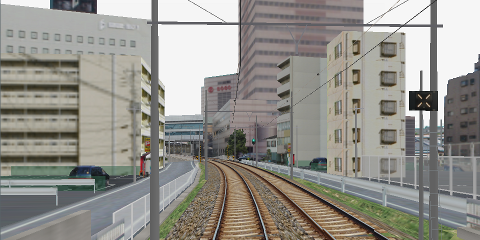
Description:
Part of the
Keisei Chiba line from
Midori-dai via
Nishi-Nobuto and
Shin-Chiba to
Chiba. Detailed route in an urban environment.
Alt.:
11B17
Stations:
4
Stops:
3
Known problems:
Line description:
Download from:
Mackoy's website. Click the link
Download
at the bottom of the webpage.
To download from this website:
N/A
Last update of this directory entry:
2018-May-31
Minobu line
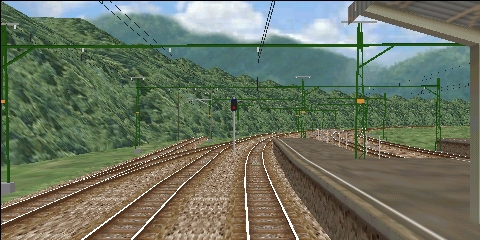
Description:
Part of the
Minobu line (
JR Central) for the class 115 train. The simulated alternative is a local train from
Higashi-Hanawa to
Fujinomiya. The line is electrified and goes through a beautiful landscape; the creator of this route has done a fantastic job creating the landscape!
Alt.:
Local
Stations:
25
Stops:
24
Known problems:
None.
Line description:
About the
Minobu line at
Wikipedia.
Download from:
The website for this route has disappeared from the Internet more than 10 years ago.
To download from this website:
OpenBVE route package ver. 1.0.0.1
The code of this route has been adapted to load without errors and warnings in Open
BVE. The graphical experience is however not changed from Gaku's original work.
Last update of this directory entry:
2023-Jun-25
Nanbu line
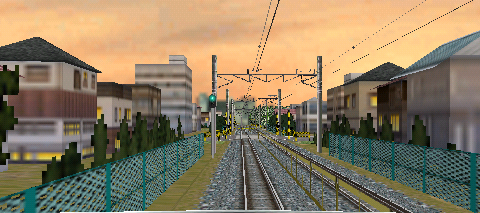
Description:
Part of the
Nanbu line, often also translated as the
Nambu line, (
JR East) from
Nakanoshima to
Hirama for the class 205 train. There are 3 alternatives for this route to select from: A daytime local train, a daytime local train in rainy weather, and an evening local train. The line's gauge is 1067
m.m. and the line is electrified (1500
V DC). Many details along the railroad and a lot of surrounding buildings.
Alt.:
Daytime
Stations:
11
Stops:
10
Alt.:
Daytime (rain)
Stations:
11
Stops:
10
Alt.:
Evening
Stations:
11
Stops:
10
Known problems:
This route uses graphic objects from the
Uchibo line which must be installed before this route can be used.
Line description:
Misc.:
The train class used for this line in real life is a class 205 version 1200
EMU with 6 cars, of which 4 motorized cars and 2 trailer cars. That train is no longer available for Open
BVE. The class 205
EMU for the
Keiyo line has similar driving properties and is used instead.
Download from:
The creator's website has disappeared from the Internet >10 years ago.
Last update of this directory entry:
2018-May-28
Nankai main line & airport line
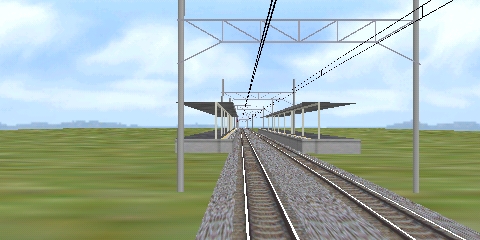
Description:
The
Hon-line (
Nankai Electric Railway
Co.,
Ltd.) from
Namba to
Wakayamashi as
Limited Express
with the class 7100 train,
Express
with the class 1000 or class 7000 trains, or as local with class 7100 train. Also
Airport Express
from
Namba to
Kansai airport, using a part of the
Hon line and then the
Kuko line, for the class 1000 train. The gauge is 1067
mm and the lines are electrified (1500
V DC). No landscape details outside the railroad.
Alt.:
Airport Express
Stations:
32
Stops:
11
Alt.:
Express (1000)
Stations:
42
Stops:
12
Alt.:
Express (7000)
Stations:
42
Stops:
11
Alt.:
Limited Express
Stations:
42
Stops:
6
Alt.:
Local
Stations:
42
Stops:
39
Known problems:
Line description:
Line map over railroads and subway in the Osaka area (Acrobat document). For all route alternatives follow the
Hon line (main line, blue-green at the map) southwards from
Namba via
Kishinosato Tamade,
Hagoromo,
Kaizuka and then westwards to
Izumisai.
The alternatives to Wakayamashi continues at the Hon line (main line, blue-green at the map) from Izumisai southwest via Misaki-koen towards Wakayamashi.
The alternatives to Kansai airport continues at the Kuko line (airport line, blue-green at the map) straight north from Izumisai to the Kansai airport.
Stations at the Nankai railway's lines. The main line is called Hon
. Click at Map
by a station name to show a map over the station and its closest surroundings.
The Nankai railway's web site (text in Japanese)
Download from:
The creator's web site has long ago disappeared from the Internet.
Last update of this directory entry:
2018-May-27
Nankai Koia line & Semboku Kosoki line
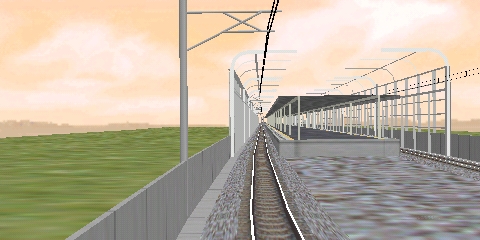
Description:
Part of the
Hon line and the
Koya line (
Nankai Electric Railway
Co.,
Ltd.) from
Namba to
Hashimoto (in real life the train continues further on from
Hashimoto to
Gokurakabashi) with a
Limited Express
alternative for the class 30000 or an
Express
alternative for the class 1000 train. A
Sub-Express
alternative from
Namba to
Rinkan-Denentosi (2 stations before
Hashimoto) for the class 6100 train. Also 2
Semi-Express
alternatives from
Namba to
Izumichou that uses a part of the
Hon line and
Koya line, then to continue along the
Semboku-Kosoku line (Osaka Prefectural Urban Development
Co), for the class 5000 train. The tracks for these lines are 1067
mm gauge and the lines are electrified (1500
V DC). No landscape details outside the railroad itself.
Alt.:
Express
Stations:
32
Stops:
13
Alt.:
Limited Express
Stations:
32
Stops:
6
Alt.:
Semi-Express 1
Stations:
20
Stops:
8
Alt.:
Semi-Express 2
Stations:
20
Stops:
11
Alt.:
Sub-Express
Stations:
34
Stops:
16
Known problems:
Line description:
Line map of railroads and subway in the Osaka area (Acrobat document). For the alternatives towards
Hashomoto and
Rinkan-Denentosi, follow the
Hon line (main line, blue-green at the map) southwards from
Namba to
Kishinosato Tamade, then the
Koya line (the
sun line
, blue-green line at the map) southeast to
Kawachi-Nagano and further on through
Amami towards
Hashimoto.
For the alternatives to
Izumichou, follow the
Hon line (main line, blue-green line at the map) southwards from
Namba to
Kishinosato Tamade, then the
Koya line (the
sun line
, blue-green line at the map) southeast to
Nakamozu, from there further on to southwards on the
Semboku-Kosoku line (pink line at the map) to
Izumichou.
Stations at the lines of the Nankai railroad. The main line is called
Hon
. Click at
Map
by a station's name to show a map over the station and its closes surroundings.
Stations at the Semboku Kosoku line. Click at
Map
by a station's name to show a map of the station and its closest surroundings.
The Nankai railroad's web site (text in Japanese)
Download from:
The creator's web site has disappeared from the Internet >10 years ago.
Last update of this directory entry:
2018-May-25
Narita line
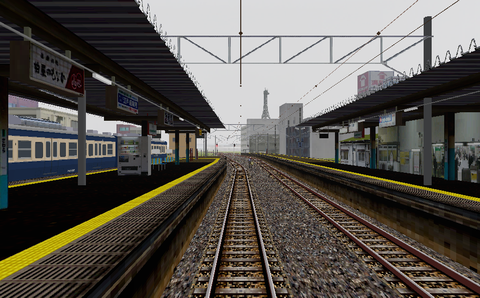
Description:
A part of
JR East operated
Narita line from
Narita to
Sawara. The line's gauge is 1067
mm and it is electrified with overhead wires 1500
V DC. A beautiful and well-done route of highest class with a lot of details and soft curves.
Alt.:
1441M (Clear)
Stations:
6
Stops:
5
Alt.:
455M (Rain)
Stations:
6
Stops:
5
Known problems:
Line description:
About the
Narita line at
Wikipedia.
Download from:
The website for this route has disappeared from the Internet.
Last update of this directory entry:
2018-Jun-19
Tsurumi-line, Ohkawa branch line
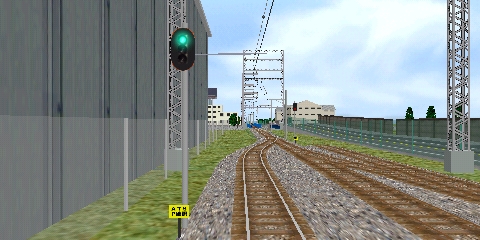
Description:
The
Tsurumi line,
Ohkawa branch line (
JR East) from
Ohkawa to
Tsurumi, for the class 103 train. The line is electrified and passes through mainly industrial areas. Many nice objects both trackside and in the line's surroundings!
Alt.:
Tsurumi
Stations:
7
Stops:
6
Known problems:
None.
Download from:
The creator's web site has disappeared from the Internet.
To download from this website:
The
Ohkawa branch line is included in the route package for
Tsurumi main line
Last update of this directory entry:
2020-Mar-06
Sagami line
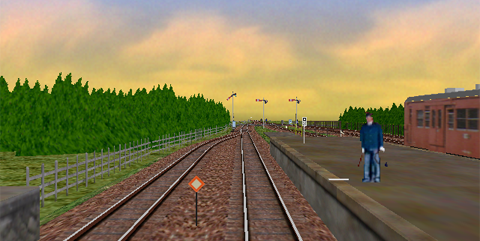
Description:
A part of the
Sagami line (
JR East) for the class 35
DMU. The simulation is of a local train from
Nishisamukawa to
Chigasaki some time back in the 1970s. At that time the branch line between
Nishisamukawa and
Samukawa was still open for traffic (it was closed in 1984) and the
Sagami line was not electrified (it was electrified 1989--1991). The line goes through a beautiful agricultural landscape, very different from the densely built area that surrounds the line nowadays. Well-done route with nice graphic objects and realistic switches.
Alt.:
Local
Stations:
5
Stops:
4
Known problems:
Download from:
The creator's website has disappeared from the Internet long, long ago.
Last update of this directory entry:
2018-May-28
Seibu Ikebukuro line
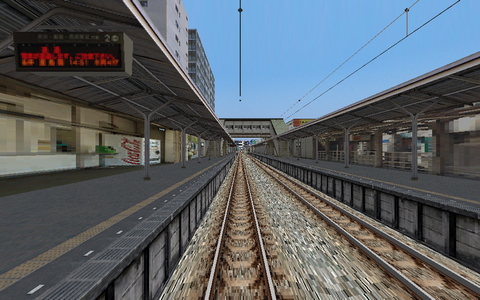
Description:
Part of the
Seibu Ikebukuro line from
Ikebukuro to
Tokorozawa. The railway is operated by the private railway operator
Seibu Railway. The railway's gauge is 1067
mm, and the line is electrified with overhead wires 1 500
V DC. Rather detailed route.
Alt.:
RE 1111 (6000)
Stations:
17
Stops:
3
Alt.:
RE 1111 (9000)
Stations:
17
Stops:
3
Known problems:
Line description:
The
Seibu Ikebukuro line at
Wikipedia.
Download from:
The website for this route has disappeared from the Internet.
Last update of this directory entry:
2018-Jun-20
Semboku Kosoku line
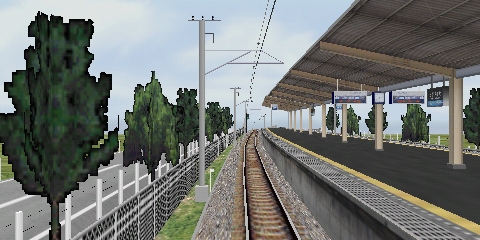
Description:
Part of the
Semboku-Kosoku line (Osaka Prefectural Urban Development
Co) from
Nakamozu to
Komyoike, for the class 6000 train. It is a 1067
mm gauge line and is electrified (1500
V DC). Many nice trackside details, and also a few landscape details.
Alt.:
Komyoike
Stations:
5
Stops:
4
Known problems:
Download from:
The creator's web site has long ago disappeared from the Internet.
Last update of this directory entry:
2018-May-27
Sendai Airport line
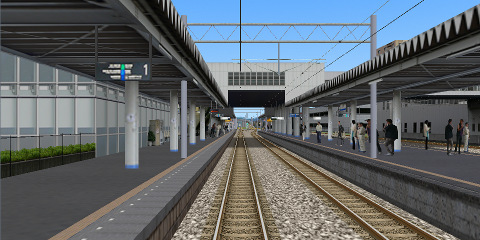
Description:
Sendai Airport line as it was before the devastating earthquake and tsunami 2011-Mar-11. The trains use the
Tohoku line from
Sendai to
Natori and from there a separate line to
Sendai airport. The line is electrified with overhead wire (20
kV AC 50
Hz), and the gauge is 1067
mm. Very well-made route with a detailed urban landscape and railway.
Alt.:
1308M Local
Stations:
8
Stops:
7
Alt.:
1360M Local
Stations:
8
Stops:
7
Alt.:
1430M Local
Stations:
5
Stops:
4
Alt.:
1430M Local (Bullet)
Stations:
5
Stops:
4
Alt.:
224M Local
Stations:
5
Stops:
3
Alt.:
3322M Express
Stations:
8
Stops:
2
Known problems:
Line description:
Sendai Airport Line on
Wikipedia
Download from:
The creator's website has disappeared from the Internet long ago.
Last update of this directory entry:
2018-Jun-01
Senseki line
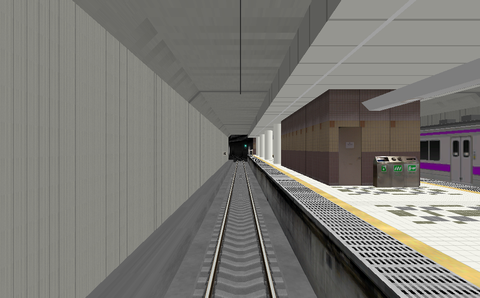
Description:
Part of the
JR East Senseki line. There are 3 alternatives to select from: An express train from
Aoba-dori to
Hon-Shiogama; A local train from
Aoba-dori to
Higashi-Shiogama; Another local train from
Aoba-dori to
Kozuru-shinden. The first part of the line is under ground, and then the line continues on the surface. No scenery details in the landscape.
Alt.:
3021S (
Exp.)
Stations:
14
Stops:
3
Alt.:
643S (
Loc.)
Stations:
15
Stops:
14
Alt.:
971S (
Loc.)
Stations:
7
Stops:
6
Known problems:
Line description:
About the
Senseki line at
Wikipedia
Download from:
The website for this route has disappeared from the Internet.
Last update of this directory entry:
2018-Jun-18
Sobu line
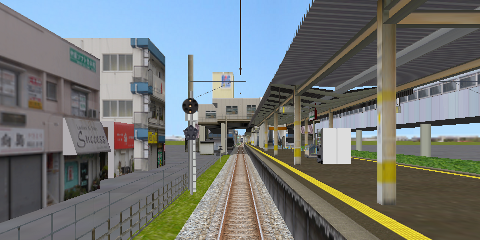
Description:
The
Sobu line, the part from
Chiba to
Sakura. The line is electrified with overhead wire (1 500
V DC) and the gauge is 1067
mm. Very well-made simulation with a lot of details trackside and in the surroundings of the route. Soft curves and realistic switches.
Alt.:
1449M (local)
Stations:
6
Stops:
5
Known problems:
Download from:
The route has disappeared from the creator's website, where now a
BVE 5 version is available of this route. It is
not compatible with Open
BVE.
To download from this website:
For further information on if and where this route for Open
BVE may be available, please send e-mail to
info@openbve.net
Last update of this directory entry:
2018-Jun-01
Togane line
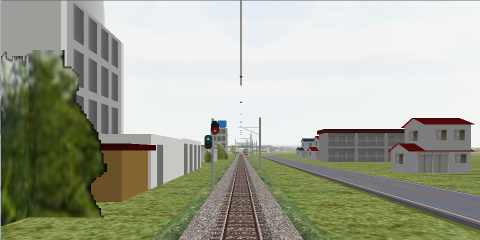
Description:
The
JR East
Togane line from the
Naruto station in
Sanmu to the
Oami station in
Oamishirasato. The line is electrified with overhead wire (1 500
V DC) and the gauge is 1067
mm. There are 4 alternatives to run this route, 2 with a class 113 4-cars consist and 2 with a class 113 6-cars consist.
Alt.:
656M2004_4
Stations:
5
Stops:
4
Alt.:
656M2004_6
Stations:
5
Stops:
4
Alt.:
656M2005_4
Stations:
5
Stops:
4
Alt.:
656M2005_6
Stations:
5
Stops:
4
Known problems:
In Open
BVE some files are missing that installs with
BVE 2.
It can be fixed by downloading and installing the missing BVE 2 files below. The files in that archive should be placed directly into the LegacyContent\Railway\Object
directory.
Download from:
The creator's website has disappeared from the Internet >10 years ago.
Last update of this directory entry:
2018-May-31
Tohoku line
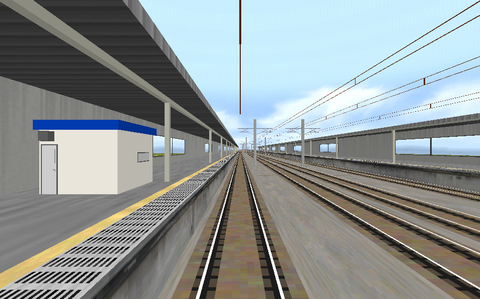
Description:
A small part of the
Tohoku line from
Nasu-Shiobara to
Utsunomiya. This is a high-speed line for the
Shinkansen high-speed trains. The lines gauge is 1435
mm and it is electrified with overhead wires 25
kV AC at 50
Hz. The line simulated has no details at all in the landscape and sparsely detailed stations. It is however a route to test the class E2
Shinkansen train.
Alt.:
250
Stations:
2
Stops:
1
Known problems:
A few objects are missing when loading this route in Open
BVE. Probably because of this, the tunnels in the route look weird.
Line description:
The
Tohoku line at
Wikipedia.
Misc.:
This route was originally made for the class 200
Shinkansen trains. The files for that train has however disappeared from the Internet
>10 years ago. Because of that the class E2
Shinkansen train is used.
Download from:
The creator's website, download English version of route, and then structure (objects) and sound.
To download from this website:
N/A
Last update of this directory entry:
2018-Jun-20
Tokoname line
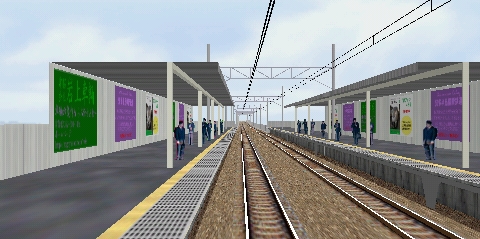
Description:
Part of the
Tokoname line (
Nagoya Railroad
Co.,
Ltd.,
a.k.a. Meitetsu), from
Otagawa to
Jingumae. A
Limited Express
alternative for the class 8500 train, an express alternative for the class 6000 train and a local alternative for the class 7500 train. The gauge is 1067
mm and the line is electrified (1500
V DC). Many trackside details, but no landscape details.
Alt.:
Express
Stations:
10
Stops:
2
Alt.:
Limited Express
Stations:
10
Stops:
1
Alt.:
Local
Stations:
10
Stops:
9
Known problems:
Line description:
Line map over the Nagoya Railway's net (Acrobat document). All route alternatives in the simulation begins at
Otagawa (between the left and the right waters at the lower part of the map, the name is also marked with western characters) and goes upwards on the map to
Jingumae (that name also marked with western characters at the map). The
Limited Express
alternative is marked withbrown or pink line at the map, the
Express
alternative with a light blue line and the local alternative with a gray line.
Stations at the Tokoname line. Click at Map
by a station name to view a map over the station and its closest surroundings.
The Meitetsu-Railway's web site (text in Japanese).
Download from:
The route and the trains are since >10 years gone from the Internet.
Last update of this directory entry:
2018-May-27
Tsurumi-line, main line
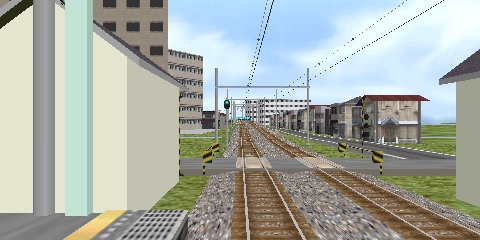
Description:
The
Tsurumi line's main line (
JR East) from
Ohgimachi to
Tsurumi, for the class 103 train. The line is electrified and passes through mainly industrial areas. Many nice objects both trackside and in the line's surroundings!
Alt.:
Tsurumi
Stations:
10
Stops:
9
Known problems:
None.
Download from:
The creator's website has disappeared from the Inernet.
To download from this website:
OpenBVE route package ver. 1.0.0.0
The code of this route has been adapted to load without errors and warnings in Open
BVE. The graphical experience is however not changed from K-Shimi's original work.
Last update of this directory entry:
2020-Mar-06
Uchibo line
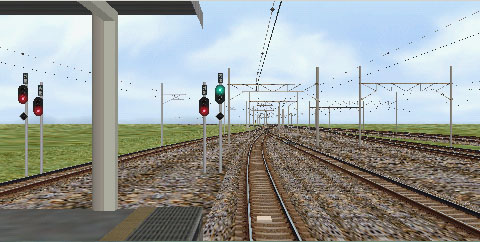
Description:
Part of the
Uchibo line (
JR East) by no one less than the creator of
BVE, Mr.
Mackoy himself. The class 113 local train goes from
Chiba to
Yawatajuku. Detailed tracks
etc. but no landscape details outside the railroad.
Alt.:
Local
Stations:
5
Stops:
4
Known problems:
None
Line description:
Map of JR Central's lines in the Tokyo area (Acrobat document) there the
Uchibo line is found in the lower right part of the map, marked in a yellow/brown color. The local alternative simulated begins in
Chiba and goes downwards at the map to
Yawatajuku
To download from this website:
N/A
Last update of this directory entry:
2018-May-23
This is search 485261 in the line directory



© Patrick Norqvist
e-mail
Last changed: 2024-Oct-26
























 © Patrick Norqvist
© Patrick Norqvist 